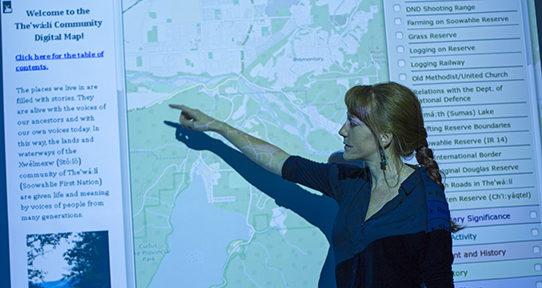Future graduate students

Our programs
We offer programs leading to a Master of Arts in two streams: History and Public History. Our PhD program allows you to specialize in a wide range of areas.
Programs require formal course work as set out in detail below. Course work is selected in consultation with the Graduate Adviser and the student's supervisor. Attention is paid to both the specific research interests of the student and the need for exposure to diverse subjects and methodologies.
- Students in the MA in History (thesis-based option) and in the PhD complete and defend a thesis or dissertation.
- Students in the MA in History (project-based MRP option) complete an extended research paper.
- Students in the MA in Public History complete a practicum and a major project.
History students with a strong interest in theory can also apply to take an enriched course load through participation in the interdisciplinary program, Cultural, Social and Political Thought.
Our faculty and researchers
Our faculty have expertise in a wide range of thematic and geographic areas. For specific areas of faculty expertise and to find a supervisor that fits your interests, see our faculty page.
What we offer
The History department has a major graduate program built around a cadre of approximately 60 students, 34 regular faculty members and 29 emeritus/adjunct professors. Fifty six of our students have won SSHRC scholarships in the last decade. Since 2000 faculty members have been awarded $5 million in research grants. Graduates of our Master’s program have gone on to build handsome careers in government, law, private enterprise, research and academia. Alumni of our doctoral program are currently teaching at universities and colleges throughout Canada.
Victoria is home to the BC Archives and the Royal BC Museum and offers a spectacular physical location for Canada’s most westerly graduate program.
A proven commitment to excellence
- The most recent academic review of UVic’s History department said that “The Department’s profile at the undergraduate, graduate, and faculty research level place it among the leading history departments in the country, and all of its members – full time and part time faculty, graduate students, and undergraduates benefit immensely from a remarkably collegial atmosphere.”
- UVic as a whole was ranked first among mid-size universities in Canada in the 2014 Maclean's survey.
- UVic History has an exceptionally strong research record and research culture, with faculty producing many award winning books and major research grants.
- Faculty in the department offer supervision is a broad range of areas. We are particularly strong in:
- Indigenous history
- digital history
- public history
- military history
- history of gender and sexuality
- political history
- racism
- immigration and ethnicity
- religion
- legal history
- environmental history
- Canadian history
- BC and the Pacific Northwest
- World
- European and colonial history
Competitive fellowships
Funding of our program by UVic’s Faculty of Graduate Studies allows us to offer competitive fellowships and TA-ships to qualified applicants.
An excellent and supportive academic environment
The program is built around opportunities for faculty-student contact, both intellectual and social, and a strong and supportive sense of community among graduate students.
Important research initiatives and RA opportunities
In the last decade, our department has provided a base for several major collaborative research projects, including:
- Great Unsolved Mysteries in Canadian History
- Indian Ocean World
- Canadian Families Project
- Canadian Century Research Infrastructure
- Veterans' Oral History Project
- Landscapes of Injustice Project
- Four Stories About Food Sovereignty Project
- Devilfish: The History and Future of Gray Whales and People project
Leadership in new technologies and in public history
- Faculty members explore non-traditional ways of conducting and communicating research, including the use of websites, GIS and a range of databases
- Students have the option to pursue the public history stream of the Master’s stream, which allows for hands-on work experience and the possibility of a new technologies final project.
- Students have produced final projects as websites, podcasts, mobile phone aps and films.
